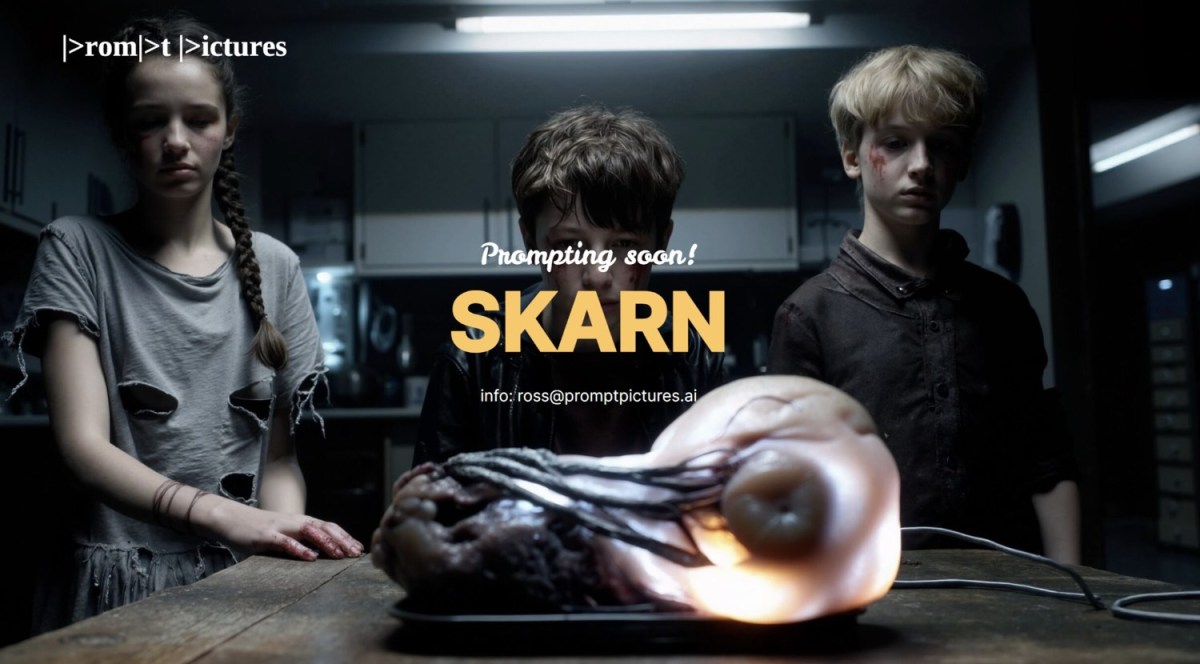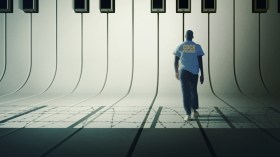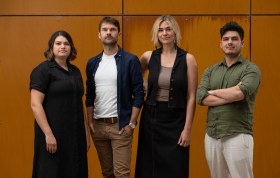The filmmaker behind Kenny has confirmed his next project will be a horror: SKARN, the feature film about teenage mistakes with devastating consequences being produced by Prompt Pictures, will be the first in Australia to use generative AI for the majority of its production.
Clayton Jacobson – whose film Kenny starred his IRL brother, Shane – has teamed up with the newly-founded production house run by actor/writer Stephen Kearney (Oddball, Garbo) and veteran producer Ross Howden (who helmed the VR Content Labs at Fox Studios) to make what they are touting as ‘Australia’s first gen AI film’, but they also call it an ‘AI-enhanced’ film in the press release.
‘We are the new kids on the block, but we’ve been around the block a few times,’ said Howden, adding that he came up with this comment himself and ‘not AI’.
SKARN: quick links
So, what’s it about? Described as a ‘psychological horror’, SKARN follows Milo, a reclusive teen who accidentally (and rather ironically) unleashes a world-altering AI that quickly begins to wreak havoc.
Jacobson, who also owns DREAMSCREEN studios, pitches SKARN as a ‘radical new chapter in storytelling’ – and a demonstration of how generative AI can assist, augment, or potentially supplant traditional filmmaking tools.
‘So much of the traditional filmmaking process is about being told “No”,’ he said in the press release. ‘We are constantly forced to compromise our vision due to budgets, weather, schedules and many external restraints beyond our control.
‘Generative AI … will benefit film-makers and audiences alike and I can’t get out of bed fast enough to play.’
The project’s futuristic ambitions may seem noble. However, it’s raising eyebrows (and will likely raise some more as the story unfolds) in an industry already grappling with the ethics and implications of AI in the creative arts.
What is SKARN?
Jacobson said that the idea is ‘very loosely’ based on a short sci-fi story written by his friend Adam Browne in the 1980s.
‘Steve [Kearney] and I were talking about potential ideas and AI,’ he told ScreenHub via email. ‘I’d literally just found Adam’s short story in a cupboard clean up the day before so it was fresh in mind.’
Its current status is as a proof-of-concept, but Kearney confirmed they are ‘definitely outputting’ the film to cinemas, and plan on distributing it to streaming platforms through a partnership with the WA based Sandbox Pictures.
How much AI will be used on SKARN?
Jacobson said that the company is still in ‘the throws’ of determining what will and won’t be AI in the film: ‘But it’s fair to say the more fantastical parts of the film will be AI. We will, for the most part, be treating AI like traditional VFX workflows.’
According to what has been released by Prompt Pictures, AI-assisted visuals will form the bulk of SKARN’s aesthetic, with post-production support from Sandbox that integrates ‘traditional techniques with AI-generated content’.
‘On a purely superficial level, many location establishing shots can be generated in AI,’ Jacobson continued. ‘Traditional location fixes and hiding of unwanted elements can often be time consuming on set – it’s getting very easy to remove such elements now with AI.’
As for the human element, Jacobson said he still wants human actors to be involved in the project:
‘Let’s also not forget my brother is an actor, so I need to be able to sit at the table with him at Christmas and not have him stab me in the throat with his chicken leg,’ he said.
SKARN and the ethics of AI and copyright
It is common knowledge now that generative AI fundamentally cannot ‘create’ or ‘invent’ new visuals – it only works by taking previously produced images, films, and other artwork and essentially remixing them into an amalgamation that divorces the visuals from their original context (and usually from their original creators).
You may have seen generative AI models referred to as a ‘plagiarism machines’, which is not an entirely innacurate assessment – but there are some methodologies that can ensure copyright work is not stolen.
‘The idea that every time you turn on AI you are copying pre-existing work is a misconception that gets bandied around a lot,’ Jacobson said. ‘One can actually choose to only have your AI model train on just the inputs you allow it to see.’ This claim is true – there are genAI models that be programmed to only use works that you have purchased the licence to.
‘Prompt Pictures works with copyright free material at the narrative level,’ Ross Howden clarified to ScreenHub, confirming that for SKARN they are working with a ‘proprietary narrative’ AI model system.
Proprietary in this context refers to generative AI models that are developed and owned by a specific company (in this case, Prompt Pictures), as opposed to open-source alternatives.
Jacobson continued: ‘I could pay a location manager to purchase images of an actual location, and rather than go to that location I can now get a AI model to train on hundreds of images of that location and it will then be able to place my actors in any part of that space.
‘At no point is there any internet scrapping (sic) or copying occurring in this example.’
‘Same can be done with wardrobe and props. We could purchase them then scan and input them for the model to train on,’ he continued. ‘If there are creatures or specific set pieces needed they can be sketched by a paid art director/artist, then the AI engine will train on that sketch and I can then add textures and colour pallets – all of which are supplied by our key HOD.’
Dr. Wellett Potter, a lecturer at the School of Law at the University of New England and noted expert in copyright, intellectual property and AI, gave ScreenHub her opinion on the legality of this process*:
‘If, as described, the AI system is trained only on data that the filmmaker has acquired or licensed with appropriate rights, such as photographs of a real-world location, then the process is, in principle, consistent with current Australian copyright law,’ she said.
‘Australian copyright law protects the exclusive right to reproduce a work or a substantial part of it (in this situation, for example, a photograph of a location),’ Potter continued.
‘If every piece of training data which is used as input into the AI system is either (1) in the public domain (so it has no owner) or (2) has been lawfully obtained under a licence or assignment, and the terms explicitly allow such use (including reproduction for the purposes of generative AI use), then training an AI model and generating outputs using that material can be lawful, even if the outputs happen to reproduce substantial elements of the original works.’
However, she clarified, generative AI models are not ever supposed to reproduce substantial elements of original creative works.
‘AI systems are designed to synthesise, not directly reproduce,’ she continued. ‘Generative AI models are designed to analyse patterns across the input data and then generate new outputs that reflect those patterns. In theory, this means the model is synthesising information rather than reproducing any specific training images in their entirety.
‘Concerns arise when models are trained on large-scale datasets without proper curation or consent, where outputs may inadvertently or deliberately resemble identifiable copyrighted works. In a tightly scoped use situation, such as this one where they are purporting to train on a specific, licensed set of images, the risk of this type of overfitting or unintended reproduction is significantly reduced.’ [bolding our own].
So is SKARN breaking the law or not?
There have been multiple cases of copyrighted works being used to train genAI that have upset the industry apple cart. For one example, The Atlantic published a tool in 2023 that allows authors to search for their books in a dataset that has been used to train generative-AI systems.
The dataset, Books3, was found to contain around 183,000 pirated books, plays and other literary works – a number of which were written by Australians.
Notable tech companies like Meta, Microsoft, EleutherAI, and Bloomberg have also all used that dataset to train their language models (LLMs), which has led to a number of lawsuits (though originally filed against Meta, Microsoft, EleutherAI, and Bloomberg, this case now proceeds solely against Bloomberg).
‘The claim that “every time you turn on AI you are copying pre-existing work” is not universally accurate, nor is it universally false,’ said Dr. Potter. ‘It depends entirely on how the AI system was built and what data it was trained on.’
Regarding SKARN: ‘the filmmaker’s approach does appear to mitigate this concern, but such statements should be made with care, given the complexity of the debate.’
‘Copyright infringement is not simply about similarity or copying per se,’ she continued. ‘It depends on whether the use is unauthorised (ie without the authorisation of the copyright owner).
‘If a licence permits reproduction or commercial reuse (as may be the case in this film production context), then output that would otherwise raise infringement concerns if it happened to be substantially similar to the source material may be legally protected, by virtue of the terms of the licence.’
In short, if Prompt Pictures formally purchases images for their generative AI model to train on (as intended), and said model can only generate images based on that dataset, then that practice is likely to be completely legal.
As to whether it’s ethical is another question entirely – and a tricky one to answer definitively.
‘The filmmaker’s approach appears to be relatively considered and responsible,’ said Potter, ‘particularly in the current climate where many generative AI tools are developed using vast quantities of content scraped from the internet without the owners’ permission.’
Potter’s expert opinion comes from having weighed up the company’s claims as outlined in the press release’s dot points.
‘The use described seems unlikely to displace human creatives (e.g. writers, visual artists, performers) in a way that undermines their livelihoods, which is a frequent ethical concern in generative AI deployments,’ she said.
Potter also explained that ethical use of AI is ‘not just about legality or consent,’: ‘I believe that it’s also about transparency, accountability, and long-term impacts on creative industries.
‘Ensuring that the use of AI does not erode meaningful human contribution or fair pay structures is also part of the ethical calculus.’
She concluded that the plan for SKARN ‘shows a degree of restraint, transparency, and responsibility that is still uncommon in the generative AI space.’
‘If upheld in practice, it represents a more conscientious model for AI use in creative industries.’
However, she contended that this area of law ‘remains fluid and contested, particularly internationally,’ and that transparency about training data, licensing terms, and role of AI in the creative process needs to be continually upheld in order to maintain both legal and ethical integrity.
It’s a tantalising proposition: a feature film production where time and cost aren’t holding back what can be achieved onscreen.
But for many artists, those very constraints are what give shape, discipline, and meaning to the creative process. Replacing the time sink of problem-solving with quick convenience could certainly be efficient, but it’s impossible to say whether it would be better in an artistic sense.
How will SKARN be licensed as a creative work?
It’s tricky to say whether SKARN itself will wholly count as a copyrighted work.
‘Since this technology is so new, it is not clear that works created with the help of AI will be protected by copyright,’ Arts and Law wrote on their website. ‘As a general rule, a work can only be protected by copyright in Australia if there is a human author who contributed “independent intellectual effort”.’
‘Because of this, it is possible that works generated by AI which don’t have enough human input won’t be protected by copyright.’
For now, Ross Howden and Prompt Pictures remain determined to distribute SKARN as one would any other feature film. It remains to be seen how that will work down the track.
The company is still in the financing stage, with production on the film due to commence in January 2026. In the meantime, the industry is watching closely.
SKARN is currently in pre-production, with a planned release date TBC.
*Dr. Wellett Potter’s comments have been provided for educational and informational purposes only and do not constitute legal advice.





